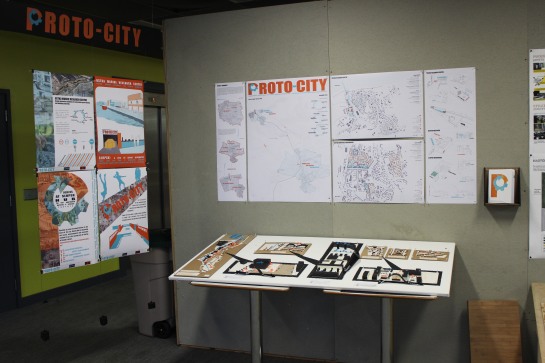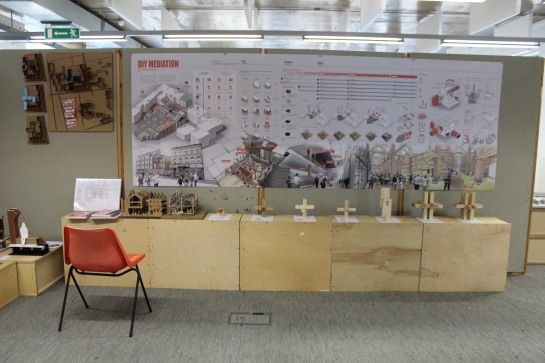March Blog is finally back with some updates on our current activities and on some of the past events. One of them is final presentation of 2 year students of their URBAN STRATEGIES for the cities of Slupsk and Ustka. Below you will find the pictures and description of some of these projects.
Group [Konstantinos Lerias, Orestis Michelakis, Tatjana Geta]:
The main problems identified in Słupsk were the following: unemployment, derelict housing stock and vacant spaces within urban blocks, urban sprawl, marginalization of poor communities and a high coal dependency for domestic heating. This proposal suggests a sequence of direct actions that will utilise existing resources (material, social and cultural) as well as participatory processes to solve these material and socio-political issues that exist in the area. This strategy does not only aim to solve this issues based on their existing condition but rather to generate the social capital that is necessary to form a resilient community that can resolve and adapt to problems that may arise in the future. Our approach is based on 3 distinctive typologies of spaces: Blocks, Allotments and Spaces of exchange. These typologies are common across not only Słupsk but Poland in general thus making the project easily adaptable to other areas. Fundamental parts of the proposal are: opening secondary routes through urban blocks, creating community infrastructure within the blocks (i.e. community workshops, urban farms, repair and recycle laboratories), gradually redistributing allotment land so it can be used collectively, as well as establishing a network of decentralized biogas plants that will utilise organic waste to distribute heat to the housing through district heating systems. This project does not only aim to resolve existing issues but rather to promote and test alternative models of coexistence, assembly and collective action; for communities to meet, share knowledge and evolve in opposition to the current neoliberal model.
Group [Kian Tai, Katarzyna Skrucha, Fabienne Blunden, Justina Krol]:
The signs of unequal socio-economic deprivation of the Slupsk has driven us to steer active participants (policy makers & NGOs) and non-active participants (public, the unskilled and the unemployed) to come together in a cohesive environment to build the future resilience of the city. Our mission is to aspire the people to take ownership on the process, creating synergies with different actors with the intention to reduce carbon emission, maintain economic development and address socio-envirionmental consequences.
Group [Luke Jerome, Adam Willis, Alistair Powe, Zafeiris Katanakis]:
“Over a 20 year period Słupsk and Ustka can integrate Syrian refugees as a catalyst to regenerate the city centre: Regeneration in terms of reformed physical housing stock, political policy, social conditions, infrastructure and education. This over time will help to establish a culture of cooperation and trust between local government and a Refugee/Immigrant/Resident community. Critical to this is an establishment of identity for inhabitants of the City.
The ‘Refugee Matters’ design document has been created to act as guidance for the development of the city; acknowledging the range of scales at which change must occur. As well as this, the design document critically appraises the wider process of urban refugee integration, particularly within the politically charged climates of EU member states.”
Group [ Mun Ng, Ian Tan, Seing Seeto, Chrysa Petrou]:
This project focuses on strengthening the existing local distinctive elements by changing its economy practice to a cradle to cradle system. The aim to improve the economy practice to a more resilience manner is to reduce the rate of unemployment in Slupsk. Several neighbour cities such as Ustka, Leba, Darlowo and others were considered to collaborate with slupsk to widen it’s economy potential through networking. Group [Alexander Wightman, Małgosia Werdon, Thomas Whettingsteel, Nikolaos Stagkos]:
Group [Alexander Wightman, Małgosia Werdon, Thomas Whettingsteel, Nikolaos Stagkos]:
The project proposes to solve the issues in both cities through the creation of local interventions in the city of Słupsk that solve social and environmental problems. The sites in Słupsk are fed by a large redevelopment in Ustka using natural resources and waste products form the sea to lead research into environmental building technologies and alternative fuels. The site in Ustka will also have public visitor elements that can lead to a more sustainable form of tourism. Research carried out in the city is implemented in the live test-bed of Słupsk. The creation of more jobs through development of these technologies and their implementation on communities will help address the debt and declining population facing the city.



















 Group [Alexander Wightman,
Group [Alexander Wightman, 